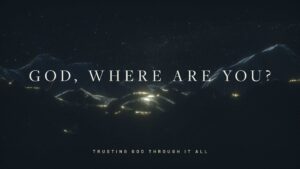“How long, Lord, must I call for help and you do not listen or cry out to you about violence and you do not save?” (Habakkuk 1:2)
Where is God when bad things happen? That’s a question we usually try to avoid or are afraid to ask. But we all ask it. The Old Testament prophet, Habakkuk, asked that question, too. As I’ve been reading this short book, I’ve been thinking a lot about these things. I’ve decided it really boils down to three questions no one asks aloud.
- Is God unfair? Doesn’t God sometimes seem inconsistent in punishing the wicked and rewarding the good?
- Is God silent? If God wants us to discern and follow his will, why doesn’t he reveal it more plainly? Why is finding God’s will often so mysterious?
- Is God hidden? Why doesn’t he simply appear visibly and show the skeptics (and us!) once and for all? Why must we live “by faith and not by sight?”
These are some tough questions, summarized in a word invented by the seventeenth century philosopher, Willhelm Leibniz. His word was theodicy, a combination of the two Greek words Theos (God) and Dike (justice). Theodicy asks the question how God can be just given the fact that there is suffering in the world.
Leibniz didn’t invent these questions. We first run into them in the Bible itself. Think about that for a second. Authors, inspired by God, asked Him these tough questions. So, it must be OK for us to ask them, right?
We’ll be digging into the Prophet Habakkuk in our new sermon series, “God, Where Are You?” If you’ve ever asked some tough questions of the Lord, you’re in good company. I hope you’ll join us Sunday.




